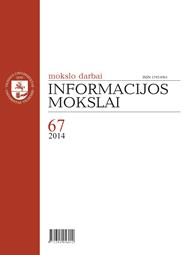Rekomendacijų reikšmė užtikrinant veiklos audito rezultatyvumą viešajame sektoriuje
THE SIGNIFICANCE OF RECOMMENDATIONS IN ENSURING THE RESULTS OF PERFORMANCE AUDIT IN PUBLIC SECTOR
Author(s): Jurga Nemanytė, Vaclovas LakisSubject(s): Economy
Published by: Vilniaus Universiteto Leidykla
Summary/Abstract: Every country, in order to finance public sector allocates much finances (funds). Performance audit evaluates it from the point of view of efficiency and effectiveness, which is performed by high level auditing institutions. The most risky areas of public sector are analyzed during the process of auditing. Therefore, in the process of research (investigation) the conclusions and the connection with the submitted recommendations were analyzed for the period of 2008–2012. There were defined 11 mistakes and several groups of shortcomings. Many shortcomings are related with public administration, not properly regulated certain processes or institutional performance, the determined regulations are not followed, the performance lacks control, the funds (finances) are not effectively used, the co-operation is rather negligible. Some mistakes and shortcomings appear systematically, which implicate, that the entities under auditing and governmental institutions do not pay proper attention to implementation of recommendations presented by performance auditors. Hence, having produced performance auditing, the highest audit institution provides recommendations to the entity under auditing, how to eliminate identified shortcomings and what measures should be taken in order to avoid the occurrence of such shortcomings in the future. In literature and auditing manuals it is stated, that the audited entity makes a decision on how to implement the recommendations. However, this opinion is not completely correct. It should not be assumed, that such institutions which undergo recommendations of auditing can decide on their own whether to follow these recommendations or not. Therefore, if it depended on the decision made by the entity under auditing the post-auditing activity would loosen its importance and performance would depend on the quality of recommendations. Moreover, the auditors must be very prudent in formulating recommendations; much more attention should be paid to the steps which have to be taken, but not to the process of doing it. According to each performance auditing result several recommendations can be provided to different institutions. During the period 2008–2012 – 964 recommendations were presented to different institutions. The greatest number of recommendations was addressed to the Government and other ministries. They are related with the necessity of changing regulations. According to the data presented by state control, 92% of presented recommendations were implemented. In fact, audited entities agree with the presented recommendations and seek to implement them. However, when the audited entities disagree with the provided recommendations they usually state, that recommendations are not relevant and the process of implementation is rather complicated. Therefore, the performance auditors should co-operate with audited entities in order to put into practice the recommendations, otherwise some unforeseen difficulties may occur.
Journal: Informacijos mokslai
- Issue Year: 2014
- Issue No: 67
- Page Range: 63-75
- Page Count: 13
- Language: Lithuanian

